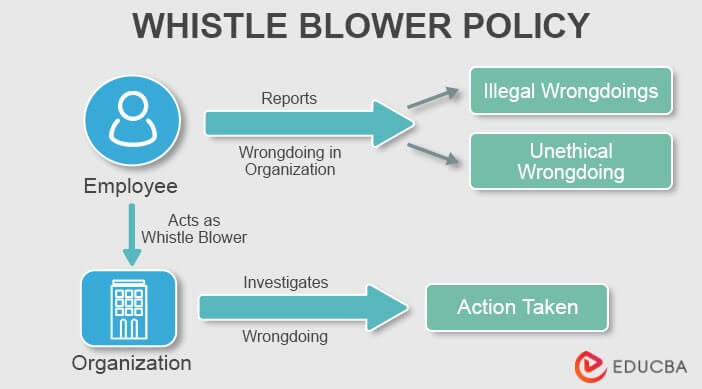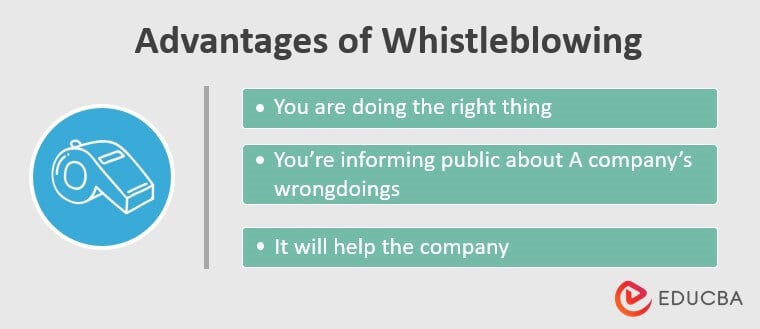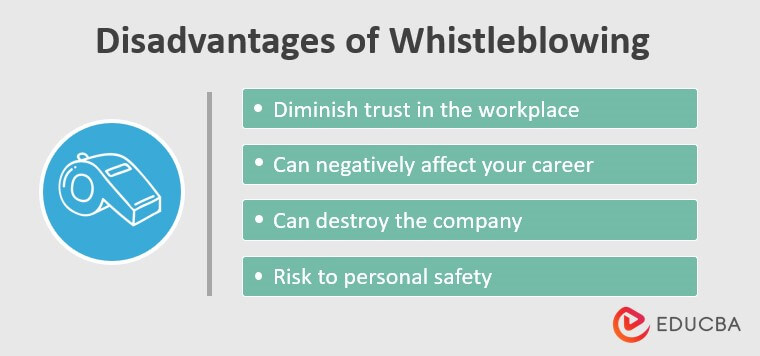What is Whistleblower Policy?
A whistleblower policy is a set of guidelines that protect employees who report illegal or unethical behavior within an organization. These policies typically outline the procedures for reporting misconduct and may also offer protection from retaliation.
Many organizations, including Apple, Amazon, and Meta, have detailed whistleblower policies to prevent such behavior and encourage open communication with the company. The goal is to create a safe environment where any employee can speak up without fear of being targeted by other members or executives of the company.
Key Takeaways
- A whistleblower policy is a written document that details how an organization will handle reports of wrongdoing.
- The policy must specify which behaviors constitute misconduct and delineate the process for reporting and investigating complaints.
- The policy aims to create a safe environment for employees to come forward with concerns without fear of retaliation.
- It also protects whistleblowers from retaliation by specifying consequences for those who do retaliate against whistleblowers.
- For example, In most whistleblower policies, organizations assert the right to discipline or terminate employees who retaliate against a whistleblower.
How Does Whistleblower Policy Work?
- When an employee reports misconduct, the organization investigates the claim and takes appropriate action. The most serious violation might result in termination. Lesser violations may lead to suspension or reprimand.
- Some organizations offer financial rewards to those who provide information about wrongdoing and maintain confidentiality throughout the process. Others provide training sessions on handling disclosure to limit the risk of retaliation.
- It’s also important that employees are not subject to harassment, discrimination, intimidation, threats, or undue pressure due to reporting misconduct.
- Therefore, whistleblowers need protection so they feel free to provide information, especially when laws are broken, or ethical standards are violated.
Aim of the Policy
- An effective whistleblower policy should detail the procedure for reporting concerns, including whom employees should report to and the steps to investigate the allegations.
- Its goal is encouraging employees to come forward with concerns without fear of retaliation.
- Additionally, the policy ensures that any repercussions for reporting are equally applicable across the organization.
- Companies typically implement policies through an employee handbook or other internal policies.
A whistleblower policy is not limited to companies in the United States. It can apply to any employer worldwide where employees work under an employment contract or other agreement. In some countries, such as India, whistleblowing has become part of legislation against corruption.
In the United States, it’s important to note that whistleblower protection laws exist on the federal and state levels. However, these protections may not always extend to private-sector employers.
Imperatives of Whistleblower Policy
- A whistleblower policy should be publicly accessible and prominently displayed throughout the workplace.
- It should ensure that all reports will be taken seriously and investigated thoroughly and promptly – regardless of their source.
- Suppose someone feels they have been retaliated against for whistleblowing. In that case, they can go through their employer’s internal complaint process or file a claim with the U.S. Department of Labor’s Occupational Safety and Health Administration (OSHA).
- Employees must exhaust these avenues before taking action in court.
Advantages of Whistleblower Policy
- A whistleblower policy encourages employees to work together with management. This helps to promote ethical practices and identify problems before they become worse.
- The policy outlines how and to whom employees should report their concerns and the protections that are in place for whistleblowers.
- It also provides information about the consequences of retaliation against whistleblowers.
- By reporting violations of ethical standards or safety hazards as soon as they occur, individuals who witness them can help address the issues early instead of waiting until it’s too late. A good example of this is the famous Volkswagen emissions scandal. People were concerned about what was happening at Volkswagen factories about emissions testing from diesel cars. The United States Environment Protection Agency (EPA) later cited Volkswagen for cheating on diesel emission tests.
- A whistleblower policy seeks to safeguard employees who report information about wrongdoing and to ensure that the company investigates such reports promptly and thoroughly.
- Reporting misconduct can benefit organizations by helping them avoid legal liability or regulatory sanctions.
- It can also provide key insights into the effectiveness of internal controls and uncover risks for investors or new areas for investigation.
- Employees may be more willing to report misconduct if they know their identities will be protected and management will take their complaints seriously.
Disadvantages of Whistleblower Policy
However, whistleblower policies can also have some disadvantages.
- If the employee handbook does not clearly define ethical or legal violations, it can be challenging for whistleblowers to determine whether they are demonstrating courage by reporting such infractions.
- For example, suppose an employee finds her boss has been making inappropriate sexual advances toward her. However, there is no mention of this in the company’s handbook, and she fears reporting it would lead to negative consequences (such as being fired). In that case, she will be less likely to come forward with this information.
- Another disadvantage is that while whistleblower policies may include provisions to protect against retaliatory actions, it doesn’t protect against other types of disciplinary action.
- So, even if employees feel confident enough to report what they see as misconduct, the company could still fire them for something else.
- In fact, many people see whistleblowing as a costly endeavor. Since colleagues usually label whistleblowers negatively and supervisors frequently issue reprimands, it can be difficult for them to come forward.
- Also, the effort expended on gathering evidence and taking time off to report their concerns might feel too much when considering all possible ramifications.
Many states have enacted legislation specifically designed to protect the rights of whistleblowers. The most recent enactment came in 2012 when California passed AB4, which amends Labor Code Section 1102.5 to provide additional protections for whistleblowers and clarify how claims involving false accusations are handled.
Conclusion
The policy typically outlines how employees can report misconduct, what protections are in place for whistleblowers, and how investigations will be conducted.
A well-crafted policy can help organizations root out wrongdoing and create a culture of transparency and accountability. The policy should clearly outline who the whistleblowers should contact with their concerns and what happens after the disclosure.
Other elements include outlining retaliation prevention measures and assuring that disclosures will be kept confidential to the extent possible.
An effective policy would also have systems in place to address reports from both current and former employees. Organizations should provide examples of types of conduct that might warrant reporting to avoid confusion about expectations. For example, these might include corruption, safety violations, or ethical breaches.
Frequently Asked Questions (FAQs)
Q1. What is the definition of a whistleblower?
Answer: A whistleblower is an individual who reports misconduct on the part of an organization or individual.
Q2. What types of misconduct can be reported?
Answer: Misconduct can include fraud, waste, corruption, abuse of power, or dangers to public health and safety.
Q3. How do I report misconduct?
Answer: You can report misconduct by contacting your organization’s human resources department or by going through the proper channels set up by your company.
Q4. Does my employer have any liability if I am fired after reporting misconduct?
Answer: If an employer terminates an employee in retaliation for reporting misconduct, they may be held liable for wrongful termination.
Q5. Is there a statute of limitations on whistleblowers?
Answer: No, you can file as long as you believe that there is more information that could help prevent this from happening again.
Q6. Who is protected under the law?
Answer: The most common types of employees covered by whistleblower laws are those who work for private sector companies. Federal employees also have protection against whistleblowing discrimination.
Recommended Articles
This has been a guide to whistleblower policy. We have explained what a whistleblower policy is, and how it works, and provided examples, advantages, and disadvantages. You can also learn more by reading the following articles:




